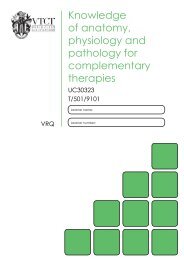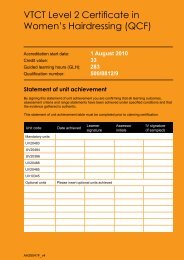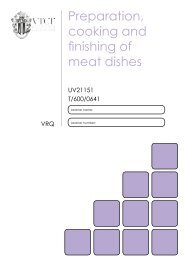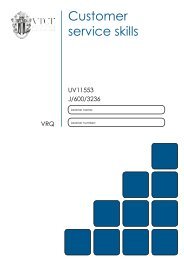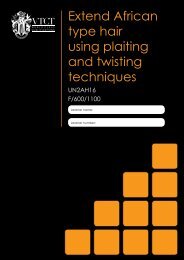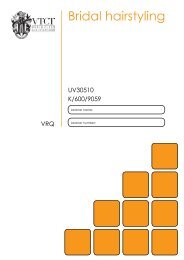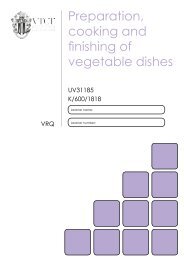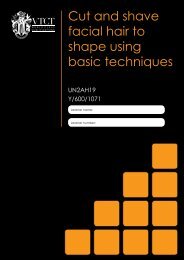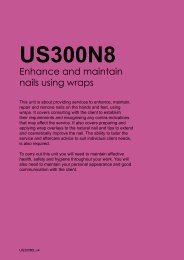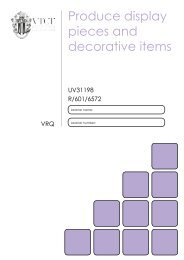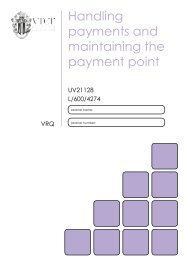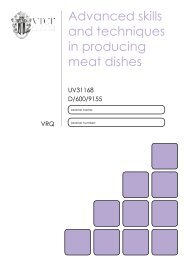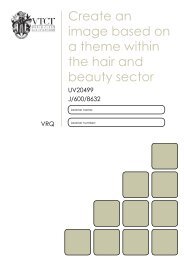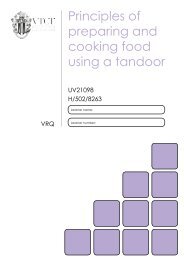Supervise food production operations - VTCT
Supervise food production operations - VTCT
Supervise food production operations - VTCT
Create successful ePaper yourself
Turn your PDF publications into a flip-book with our unique Google optimized e-Paper software.
<strong>Supervise</strong> <strong>food</strong><br />
<strong>production</strong><br />
<strong>operations</strong><br />
UT30975<br />
J/502/9566<br />
Learner name:<br />
Learner number:
Statement of unit achievement<br />
By signing this statement of unit achievement you are confirming that all learning outcomes, assessment<br />
criteria and range statements have been achieved under specified conditions and that the evidence<br />
gathered is authentic.<br />
This statement of unit achievement table must be completed prior to claiming certification.<br />
Unit code Date achieved Learner signature<br />
Assessor tracking table<br />
<strong>VTCT</strong> is the specialist awarding body for the Hairdressing, Beauty Therapy, Complementary Therapy,<br />
Hospitality and Catering and Sport and Active Leisure sectors, with over 45 years of experience.<br />
<strong>VTCT</strong> is an awarding body regulated by national organisations including Ofqual, SQA, DfES and CCEA.<br />
<strong>VTCT</strong> is a registered charity investing in education and skills but also giving to good causes in the area<br />
of facial disfigurement.<br />
Assessor name Assessor signature<br />
Assessor<br />
initials<br />
Assessors<br />
initials<br />
IV signature<br />
(if sampled)<br />
All assessors using this Record of Assessment book must complete this table. This is required for<br />
verification purposes.<br />
Assessor number<br />
(optional)
UT30975<br />
<strong>Supervise</strong> <strong>food</strong> <strong>production</strong><br />
<strong>operations</strong><br />
The aim of this unit is to develop your knowledge,<br />
understanding and practical skills when supervising <strong>food</strong><br />
<strong>production</strong> to ensure timescales and standards are met.<br />
You will learn how to make sure staff have the necessary<br />
skills, knowledge and resources required to carry out their<br />
work.<br />
UT30975_v7
NOS<br />
HSL7<br />
Level<br />
Credit value<br />
GLH<br />
3<br />
4<br />
20<br />
Observation(s)<br />
2<br />
External paper(s)<br />
0
<strong>Supervise</strong> <strong>food</strong> <strong>production</strong><br />
<strong>operations</strong><br />
Learning outcomes<br />
On completion of this unit you will:<br />
1. Be able to supervise <strong>food</strong> <strong>production</strong><br />
<strong>operations</strong><br />
2. Understand how to plan <strong>food</strong> <strong>production</strong><br />
<strong>operations</strong><br />
3. Understand how to supervise <strong>food</strong><br />
<strong>production</strong> <strong>operations</strong><br />
Evidence requirements<br />
1. Environment<br />
Evidence for this unit should be gathered<br />
within the workplace, however, you may<br />
be assessed within an approved realistic<br />
working environment (RWE) that meets<br />
People 1st’s criteria.<br />
2. Simulation<br />
Simulation is allowed for outcome 1h, if no<br />
naturally occurring evidence is available.<br />
3. Observation outcomes<br />
Competent performance of Observation<br />
outcomes must be demonstrated on<br />
at least two occasions. Assessor<br />
observations, witness testimonies and<br />
products of work are likely to be the most<br />
appropriate sources of performance<br />
evidence. Professional discussion may be<br />
used as supplementary evidence for those<br />
criteria that do not naturally occur.<br />
Assessed observations should not be<br />
carried out on the same day for the<br />
same learning outcome. There should be<br />
sufficient time between assessments for<br />
reflection and personal development.<br />
You need to meet the same standard on a<br />
regular and consistent basis. Separating<br />
the assessments by a period of at least two<br />
weeks is recommended as competence<br />
must be demonstrated on a consistent and<br />
regular basis.<br />
4. Knowledge outcomes<br />
There must be evidence that you possess<br />
all the knowledge and understanding<br />
listed in the Knowledge section of this<br />
unit. In most cases this can be done<br />
by professional discussion and/or oral<br />
questioning. Other methods, such as<br />
projects, assignments and/or reflective<br />
accounts may also be used.<br />
5. Tutor/Assessor guidance<br />
You will be guided by your tutor/assessor<br />
on how to achieve learning outcomes in this<br />
unit. All outcomes must be achieved.<br />
6. External paper<br />
There is no external paper for this unit.<br />
UT30975<br />
3
4<br />
Achieving observations<br />
and range<br />
Achieving observation outcomes<br />
Your assessor will observe your performance<br />
of practical tasks. The minimum number of<br />
competent observations required is indicated in<br />
the Evidence requirements section of this unit.<br />
Criteria may not always naturally occur during<br />
a practical observation. In such instances you<br />
will be asked questions to demonstrate your<br />
competence in this area. Your assessor will<br />
document the criteria that have been achieved<br />
through professional discussion and/or oral<br />
questioning. This evidence will be recorded<br />
by your assessor in written form or by other<br />
appropriate means.<br />
Your assessor will sign off a learning outcome<br />
when all criteria have been competently<br />
achieved.<br />
Achieving range<br />
There is no range section that applies to this<br />
unit.<br />
UT30975<br />
Guidance for tutors and assessors<br />
Tutors and assessors must refer to the<br />
document(s) listed below, prior to delivering<br />
this unit. Document(s) can be downloaded from<br />
http://www.people1st.co.uk:<br />
• Sector Assessment Strategy for<br />
competence based units of assessment<br />
and qualifications
Learning outcome 1<br />
You can:<br />
a. Ensure that all stages of <strong>food</strong> <strong>production</strong><br />
comply with relevant legislation and<br />
organisational policies*<br />
b. Implement procedures to meet control<br />
points following relevant legislation and<br />
organisational policy*<br />
c. Ensure that procedures are being followed<br />
correctly*<br />
d. Ensure staff have the skills, knowledge and<br />
resources needed*<br />
e. Encourage staff to ask questions when<br />
needed*<br />
f. Encourage staff to report any problems with<br />
the control points*<br />
g. Collect feedback that may help to identify<br />
any problems with procedures*<br />
h. Manage problems that may affect <strong>food</strong><br />
<strong>production</strong> or the standard of <strong>food</strong> service*<br />
i. Complete the required records according to<br />
organisation’s procedures*<br />
*May be assessed by supplementary evidence.<br />
Observations<br />
Be able to supervise <strong>food</strong> <strong>production</strong> <strong>operations</strong><br />
Observation 1 2 Optional Optional<br />
Criteria questioned orally<br />
Date achieved<br />
Portfolio reference<br />
Learner signature<br />
Assessor initials<br />
j. Ensure staff’s agreed targets are achieved*<br />
UT30975<br />
5
6<br />
Developing knowledge<br />
Achieving knowledge outcomes<br />
You will be guided by your tutor and assessor<br />
on the evidence that needs to be produced.<br />
Your knowledge and understanding will be<br />
assessed using the assessment methods listed<br />
below*:<br />
• Projects<br />
• Observed work<br />
• Witness statements<br />
• Audio-visual media<br />
• Evidence of prior learning or attainment<br />
• Written questions<br />
• Oral questions<br />
• Assignments<br />
• Case studies<br />
• Professional discussion<br />
Where applicable your assessor will integrate<br />
knowledge outcomes into practical observations<br />
through professional discussion and/or oral<br />
questioning.<br />
When a criterion has been orally questioned<br />
and achieved, your assessor will record this<br />
evidence in written form or by other appropriate<br />
means. There is no need for you to produce<br />
additional evidence as this criterion has already<br />
been achieved.<br />
Some knowledge and understanding outcomes<br />
may require you to show that you know and<br />
understand how to do something. If you have<br />
practical evidence from your own work that<br />
meets knowledge criteria, then there is no<br />
requirement for you to be questioned again on<br />
the same topic.<br />
*This is not an exhaustive list.<br />
UT30975
Knowledge<br />
Learning outcome 2<br />
Understand how to plan <strong>food</strong> <strong>production</strong> <strong>operations</strong><br />
You can: Portfolio reference<br />
a. Explain how to organise a team to ensure that <strong>food</strong> <strong>production</strong><br />
<strong>operations</strong> are efficient<br />
b. Describe the skills required to implement the organisation’s<br />
procedures for <strong>food</strong> <strong>production</strong><br />
c. Compare the skills required for <strong>food</strong> <strong>production</strong> with those<br />
available<br />
d. Explain how to estimate the resources needed for <strong>food</strong> <strong>production</strong><br />
<strong>operations</strong><br />
e. Explain how to make best use of resources available<br />
f. Identify who to approach to get approval for additional resources<br />
UT30975 7
8<br />
Learning outcome 3<br />
Understand how to supervise <strong>food</strong> <strong>production</strong> <strong>operations</strong><br />
You can: Portfolio reference<br />
a. Identify legislation, other industry specific regulations, and codes of<br />
practice that need to be followed<br />
b. Describe the roles and responsibilities of individuals in the<br />
organisation and own area of responsibility that are relevant to<br />
<strong>food</strong> <strong>production</strong><br />
c. Identify the <strong>food</strong> <strong>production</strong> timescales<br />
d. Explain the importance of portion control<br />
e. Explain how to minimise wastage<br />
f. Explain the importance of quality of the <strong>food</strong> <strong>production</strong> operation<br />
g. Explain how to assess the quality of own and others’ work<br />
h. Explain how to motivate staff to achieve the required standards of<br />
quality<br />
i. Explain how to monitor activities and performance against<br />
organisational standards and targets<br />
j. Explain what to do when performance does not meet standards<br />
and targets<br />
k. Explain importance of confidentiality<br />
l. Explain how confidential information can be kept secure<br />
m. Describe the acceptable format for presenting and storing<br />
information in your area of responsibility<br />
n. Explain when it is appropriate to use spoken or written instructions,<br />
or demonstrations and pictures/diagrams<br />
o. Identify when and how to provide information to management<br />
UT30975



